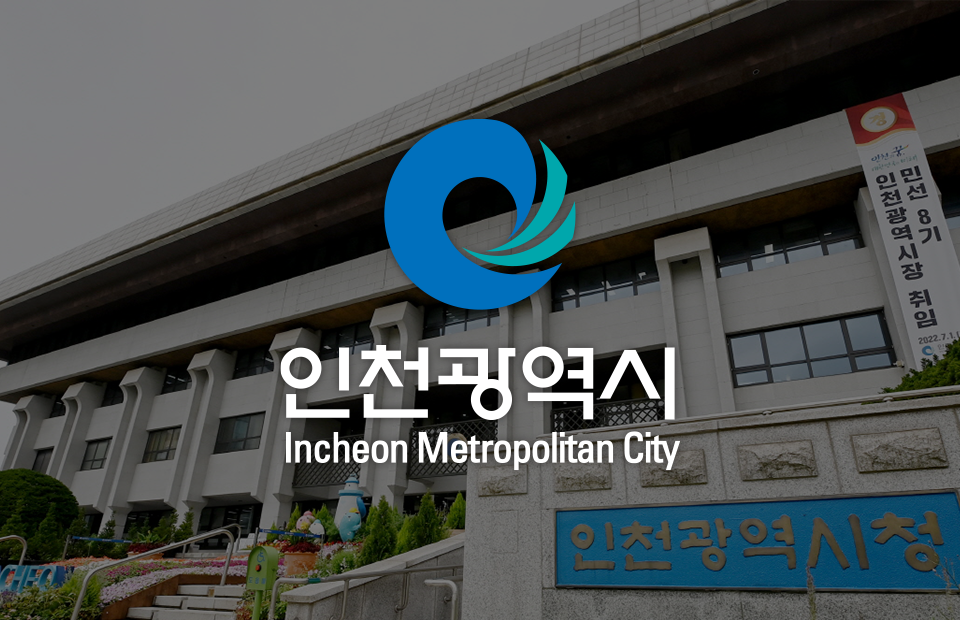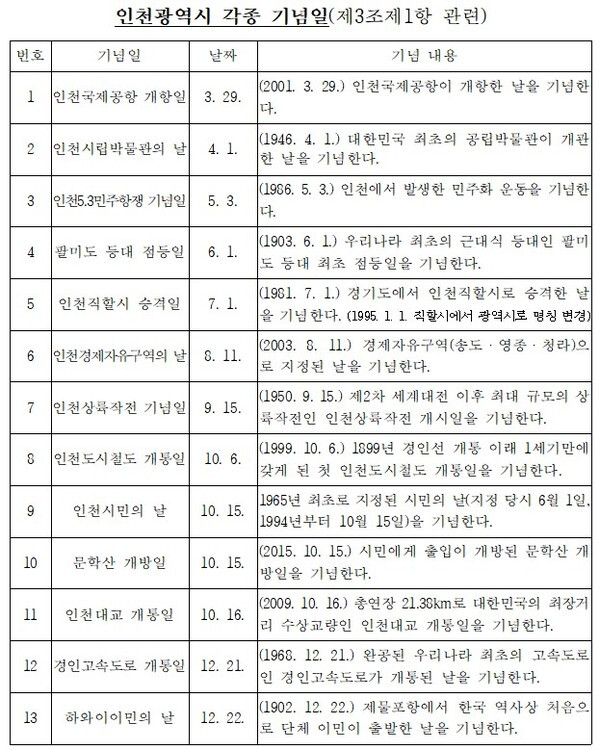
Incheon, South Korea – In a significant move to solidify its identity and foster civic pride, Incheon Metropolitan City is spearheading the establishment of an "Ordinance on Various Commemorative Days." This legislative effort aims to honor historical events that have shaped the city, thereby preserving their value and promoting a deeper sense of belonging among its citizens. The proposed legislation, officially titled the "Incheon Metropolitan City Ordinance on Various Commemorative Days, Etc.," was submitted to the City Council on May 25th.
The ordinance is structured into key articles, including Article 1 (Purpose), Article 2 (Definitions), Article 3 (Commemorative Days, Etc.), and Article 4 (Commemorative Ceremonies and Events), along with supplementary provisions. At its core, Article 3 outlines the specific commemorative days designated by the Mayor (Appendix 1) and the criteria for their designation (Appendix 2). Article 4 grants the Mayor the authority to hold ceremonies or events on these commemorative days when deemed necessary.
Designated Commemorative Days
The city has put forth a list of 13 commemorative days in "Appendix 1: Various Commemorative Days of Incheon Metropolitan City." These include:
Incheon International Airport Opening Day: March 29
Incheon Municipal Museum Day: April 1
Incheon 5.3 Democratization Movement Day: May 3
Palmi-do Lighthouse Lighting Day: June 1
Incheon Metropolitan City 승격 Day (Promotion to Metropolitan City): July 1
Incheon Free Economic Zone Day: August 11
Incheon Landing Operation Day: September 15
Incheon Urban Railway Opening Day: October 6
Incheon Citizens' Day: October 15
Munhak Mountain Opening Day: October 15
Incheon Grand Bridge Opening Day: October 16
Gyeongin Expressway Opening Day: December 21
Hawaii Immigration Day: December 22
Notably, several proposed commemorative days, such as Incheon Port Opening Day, Gyeongin Railway Opening Day, and Braille Day, were excluded. This decision was based on diverse historical interpretations and the fact that national events already commemorate similar occasions. For instance, Railroad Day, originally observed on September 18th to mark the opening of the Gyeongin Line (Korea's first railway), was changed by the State Council in May 2018 to June 28th. This shift aimed to shed remnants of Japanese colonial rule and restore national autonomy, with the new date commemorating the establishment of Korea's first railway bureau. Similarly, the government designated "Hangul Braille Day" as November 4th, based on the Braille Act.
Requests from Ongjin County, including the Ganghwa-Ongjin Integration Day (March 1, 1995, marking the incorporation of Gyeonggi-do's Ganghwa and Ongjin counties into Incheon Metropolitan City) and Spotted Seal Day (August 25, 2011, commemorating the release of "Bokdongi," a rescued spotted seal pup, into Baekryeongdo's Hanyeo Sea), were also put on hold for re-evaluation. The city cited a perceived lack of broader representation and symbolism for Incheon as a whole for their postponement.

Criteria for Designation
"Appendix 2: Criteria for Designation of Commemorative Days" outlines the guidelines for selecting these significant dates. A day can be designated if it holds great significance in establishing Incheon City's identity and foundation for development or if it is otherwise valuable for designation as a commemorative day due to broad public consensus.
Conversely, the ordinance explicitly prohibits the designation of days that:
Are similar or overlap in meaning or nature with existing commemorative days.
Are limited to specific regions, certain groups, or individual interest organizations.
Are deemed more appropriate for private sector initiatives.
Require the promotion of private autonomy or are purely within the private sector's domain.
Implementation and Repeal
The "Incheon Metropolitan City Ordinance on Various Commemorative Days, Etc." includes supplementary provisions regarding its implementation. Article 1 (Effective Date) states that the ordinance will take effect from the date of its promulgation. Article 2 (Repeal of Other Ordinances) stipulates the abolition of the "Incheon Metropolitan Citizens' Day Ordinance." Finally, Article 3 (Transitional Measures) ensures that "Incheon Citizens' Day" designated prior to the enforcement of this new ordinance, along with other commemorative days designated by the Mayor, will be recognized as if they were designated under the provisions of this new ordinance.
This comprehensive legislative effort underscores Incheon's commitment to honoring its rich history and fostering a collective sense of pride among its residents, laying a stronger foundation for the city's future.
[Copyright (c) Global Economic Times. All Rights Reserved.]



























